MercoPress. South Atlantic News Agency
Tag: Catalonia Independece
-
Thursday, December 31st 2015 - 08:35 UTC
Spain's Socialists rules out any partner that supports Catalonia independence referendum
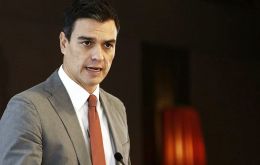
Spain's Socialist party ruled out forming a new government with any party that supported a referendum on independence in Catalonia, a stand that prolongs political uncertainty after this month's inconclusive national election.
-
Tuesday, November 10th 2015 - 05:56 UTC
Rajoy says “Catalonia is not going anywhere, nothing is going to break”

Spanish Prime Minister Mariano Rajoy announced on Monday his government would file an appeal with the Constitutional Court to ensure that an independence declaration backed by the Catalan regional parliament has “no consequences”, he told a news conference.
-
Thursday, October 1st 2015 - 08:31 UTC
A homage, ‘Keep calm and carry on’
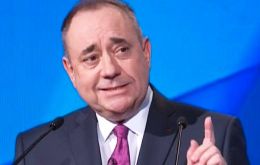
By Alex Salmond (*) - I do not know if Artur Mas, the president of Catalonia, deliberately chose the eclipse of the super-moon as the day on which to hold the most important election in Catalonia’s democratic history.
-
Tuesday, August 4th 2015 - 05:27 UTC
Catalonia challenges Madrid: calls elections for September, ahead of Spain's national ballot in November
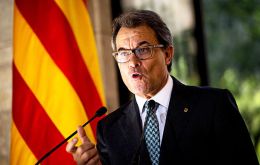
The leader of Spain's wealthy Catalonia region President signed a decree on Monday calling parliamentary elections for 27 September, a year earlier than necessary and according to political analysts, a proxy vote on the much debated controversial independence.
-
Tuesday, October 14th 2014 - 06:19 UTC
Falklands case at Gibraltar conference on self-determination and independence
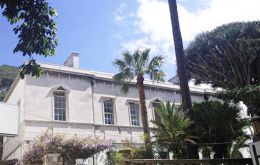
An international symposium looking at the historical backdrop underpinning the concepts of self-determination, devolution, and independence on self-determination will take place next Thursday and Friday in Gibraltar. The aim of this conference is to look at these concepts and to explore them across a number of different examples.
-
Monday, September 29th 2014 - 08:15 UTC
Spain's constitutional court to decide on Catalonia's referendum announcement

Catalonia's president on Saturday formally called a referendum to decide whether Spain's richest region should be independent, defying Madrid which vowed to block the move. Shortly after Artur Mas set the vote for November 9, the Spanish government said the referendum would not take place because it was “unconstitutional”.
-
Monday, September 15th 2014 - 04:18 UTC
The movements the Scotland independence vote has arousen in Europe
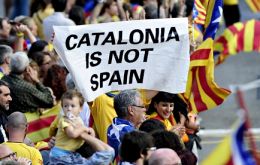
In Europe's eastern half, the disintegration of the Soviet Union and Yugoslavia created many new countries. In Western Europe, however, borders of the old nation states seemed to be carved in stone and although there have been secessionist tendencies, some of them militant, they never seemed to have a shot in reality, according to a Deutsche Welle report from Berlin.
-
Friday, August 1st 2014 - 08:08 UTC
Catalonia's independence referendum is on, underlines president Mas
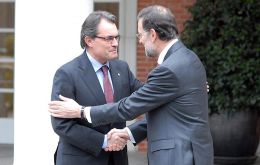
Spanish Prime Minister Mariano Rajoy and Catalan President Artur Mas failed to break the deadlock over Catalonia’s independence drive, with both holding firm on their positions when they met for the first time in a year.
-
Thursday, April 10th 2014 - 06:02 UTC
Mas defies Madrid: Catalonia will go ahead with the independence referendum
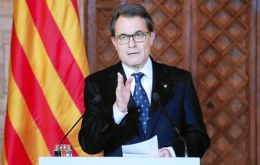
Catalonia President Artur Mas said he would forge ahead with his region's plans to hold a referendum on independence in November after Spain's parliament overwhelmingly rejected the petition. After a seven-hour debate in Madrid, and despite heavy support for the separatist movement in the wealthy northeastern region, 299 lawmakers voted against, 47 voted for and one abstained.
-
Saturday, January 18th 2014 - 04:58 UTC
Catalonia lawmakers have asked Madrid for a referendum on the region's future

Lawmakers from the Spanish region of Catalonia voted to seek a referendum on breaking away from Spain on Thursday, setting themselves up for a battle with an implacably opposed central government in Madrid. The Catalan Parliament in Barcelona voted 87 to 43, with 3 abstentions, to send a petition to the national parliament seeking the power to call a popular vote on the region’s future.
